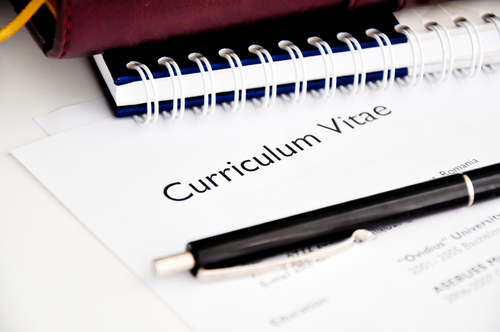In this day and age, CVs aren’t needed that much – especially if you’re a student trying to find a job. There are so many options for applying for them: online applications, online resume builders, online questionnaires, online cover letters (if you haven’t already noticed, almost everything is online these days)… the list continues. But it’s good to have one central point of reference so you don’t miss off any of your fantastic skills. ‘What is this?’ you may ask. The answer: An awesome CV.
The thing is, these things are trickier than you think. In my third year of uni, I sat in a class for almost two hours learning how to get it right, and it paid off because I’m here talking to you guys and gals now. So what I’m going to do is pass on some of the knowledge I acquired, but instead of taking two hours, I’m going to take two days. JK kidding, JK kidding. Two minutes, honest.
Here goes:
1) Your name, big and bold, right at the top. I don’t mean for you to scroll all the way down to 72pt. Size 24pt/26pt is fine. You want it to say: “Hi! This is who I am. Now read my CV.”
2) Address, phone number, email address. 11pt is good for this. 12pt at a push, but don’t go any smaller than 11pt because if the employer didn’t need glasses before they read it, they’ll need them after. It might be worth mentioning here that your email address should be a sensible one, i.e. not your favourite characters’ names from Breaking Bad, or lyrics from a One Direction song. Just your name is fine, first and/or last @whatever.com/co.uk. Careful with underscores, as your email address is likely to hyperlink itself (e.g.john_smith@something.com). If it does this, press the backspace button once, and the hyperlink will disappear. This will ensure that the employer doesn’t miss out the underscore. If they do, your offer of an interview is getting lost in cyberspace.
3) Personal statement. Don’t panic. This is nothing like the one you wrote when you were trying to get into uni – promise. This consists only of one paragraph. That’s it. BUT – and it’s a big but – this is the first paragraph employers are going to read about you, and it could be the decider of whether you’re called to interview or not. So make it amazing. Why not start with your qualification? E.g. “As a BA English graduate from Coventry University, I have consistently kept to strict deadlines…” Go on to mention any key skills that arerelevant to the job (in other words, don’t mention that you can lick your elbow, or anything), and say why you think these skills qualify you for the vacancy. Make it punchy, catchy and short. No exclamation marks! Done.
4) Education. Write down the most recent first, along with any modules you think may stand out and help you get an interview. This isn’t essential, so don’t worry if you can’t think of any. It’s fine to say that you “Passed 3 A-Levels at grades A*-C”, or that you “Passed 10 GCSEs including English, Mathematics and Science”. You don’t need to specify every single exam you sat. As long as you passed them, that’s all that matters.
5) Experience. Again, most recent first. State the job title, then the dates from-to (this can be a current position, so if it is, write “current”), along with the institution you worked for. Then outline a couple of responsibilities you had. A good way to do this is to first state the manner in which you did it, the task you carried out, and then the result of your work. E.g. “I consistently delivered good customer service with praise from managers”. Try to think of at least three.
6) Skills. Three is also a magic number in this case. State how good you are in these skills, and again, make sure it’s relevant. E.g. “I am a confident user of Microsoft Word, Outlook and PowerPoint”.
7) Interests. Just bullet-point these. It’ll give them a rough idea of your personality, but it actually doesn’t matter. The personality bit comes in during the interview. At the moment, they just want to know what you can do. Again, three is a good number for a CV.
8) Notice period. E.g. “I require one month of notice for all potential job offers”. This is subject to you, of course; you may be able to start immediately.
9) References. If you have no previous work experience, this can be from another professional e.g. your college or university tutor (make sure you have their consent). Try to include at least two. Your CV doesn’t want to be more than two pages long, so only do this if you have space. If you don’t, it’s fine to say: “References available upon request”.
Right, that’s content out of the way. Now onto CV etiquette:
10) Employers don’t like white space, so make sure there isn’t loads of it on your CV. If necessary, have a play around with the rulers in your word document; about a centimetre and a half of space is ideal. This will also give you more space to write, if needed – but don’t go overboard on the writing front, because they don’t want to spend longer than a few minutes scanning through.
11) Two different fonts – maximum. Your CV must be consistent. Use one font for headings, another for the body. Make sure it’s sensible and easy to read. Arial, Times New Roman and my personal favourite, Cambria, are good options. Underline or make bold the subheadings if you wish, but don’t be excessive.
12) Third person/First person arguments. Don’t have them. If you’re going to write in third, write in third. If you’re going to write in first, write in first. It’s no use saying “An English graduate from Coventry University. I have consistently kept to strict deadlines…” because the employer’s going to get confused. It’s all about consistency.
Remember, your CV will change every time there’s a new academic/professional/personal detail in your life, so don’t worry if you find that you’re always adding to it. Just make sure that every single version of you screams: “that job is MINE!”.
You’ll be glad to know that I’m finally done. Good luck with the job hunt, and if there’s anything I haven’t touched on here, don’t hesitate to tweet us @covcampus. Alternatively, head over to the Centre for Academic Writing, which is located in the library. They can help you in all areas: cover letters, CVs and your course-related writing.
– Karis ![]()






